Isotopes
Isotopes are atoms of the same element that have the same number of protons in their nucleus but different numbers of neutrons. This means that isotopes of an element have the same atomic number, which determines the element's identity, but different mass numbers, which represents the total number of protons and neutrons in the nucleus.
Key Points to Remember:
- Isotopes have the same number of protons but different numbers of neutrons.
- Isotopes of an element have the same chemical properties but different physical properties due to their varying atomic masses.
- Isotopes are identified by their mass number, which is the total number of protons and neutrons in the nucleus.
- Some isotopes are stable, while others are radioactive and undergo decay over time.
Study Guide:
Here are some key concepts and questions to help you understand isotopes:
Atomic Structure:
- What are the three main subatomic particles and their respective charges and locations in an atom?
- How is the atomic number of an element determined?
- What is the significance of the mass number in an isotope?
Types of Isotopes:
- What is the difference between stable and radioactive isotopes?
- Give examples of stable isotopes and their uses in various fields (medicine, industry, research, etc.).
- Explain the concept of radioactive decay and its implications for isotopes.
Applications and Significance:
- How are isotopes used in radiometric dating to determine the age of rocks and fossils?
- Discuss the role of isotopes in nuclear medicine, particularly in diagnostic imaging and cancer treatment.
- Explain the importance of isotopes in understanding the Earth's climate and environmental changes.
Understanding isotopes is crucial in various scientific fields and has wide-ranging applications in research, industry, and healthcare.
[Isotopes] Related Worksheets and Study Guides:
.◂Science Worksheets and Study Guides Sixth Grade. Birds and Mammals
Study Guide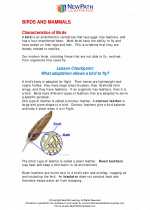 Birds and Mammals
Birds and Mammals  Activity Lesson
Activity Lesson Birds & Mammals
Birds & Mammals  Worksheet/Answer key
Worksheet/Answer key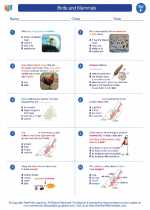 Birds and Mammals
Birds and Mammals  Worksheet/Answer key
Worksheet/Answer key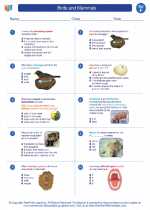 Birds and Mammals
Birds and Mammals  Worksheet/Answer key
Worksheet/Answer key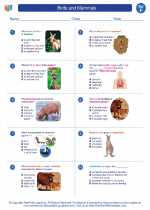 Birds and Mammals
Birds and Mammals  Worksheet/Answer key
Worksheet/Answer key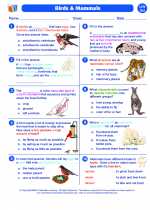 Birds and Mammals
Birds and Mammals  Vocabulary/Answer key
Vocabulary/Answer key Birds and Mammals
Birds and Mammals  Vocabulary/Answer key
Vocabulary/Answer key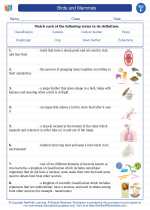 Birds and Mammals
Birds and Mammals  Vocabulary/Answer key
Vocabulary/Answer key Birds and Mammals
Birds and Mammals  Vocabulary/Answer key
Vocabulary/Answer key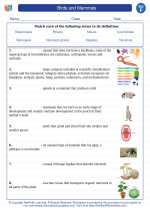 Birds and Mammals
Birds and Mammals  Vocabulary/Answer key
Vocabulary/Answer key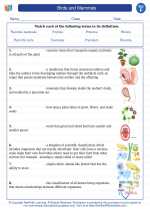 Birds and Mammals
Birds and Mammals 

 Activity Lesson
Activity Lesson
 Worksheet/Answer key
Worksheet/Answer key
 Worksheet/Answer key
Worksheet/Answer key
 Worksheet/Answer key
Worksheet/Answer key
 Worksheet/Answer key
Worksheet/Answer key
 Vocabulary/Answer key
Vocabulary/Answer key
 Vocabulary/Answer key
Vocabulary/Answer key
 Vocabulary/Answer key
Vocabulary/Answer key
 Vocabulary/Answer key
Vocabulary/Answer key
 Vocabulary/Answer key
Vocabulary/Answer key

The resources above cover the following skills:
LIFE SCIENCE
From Molecules to Organisms: Structures and Processes